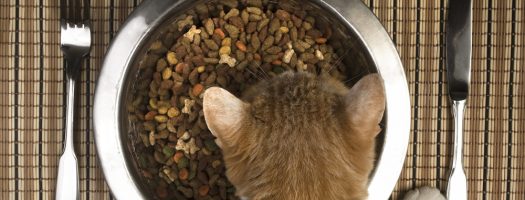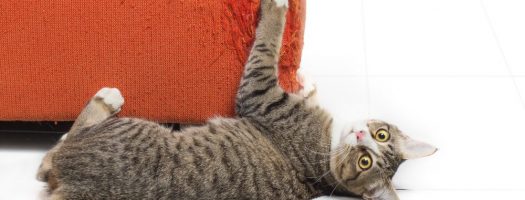The 10 Best Probiotics for Your Cat in 2026
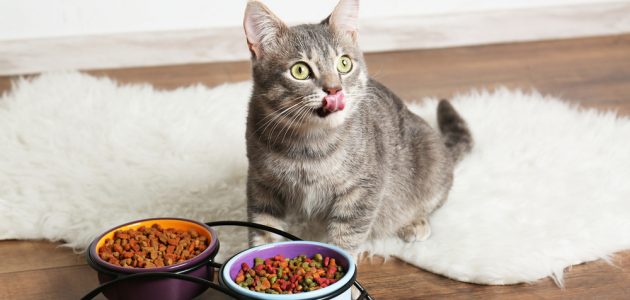
When things go well, you may not think about your feline friend’s digestive tract often, but when your cat is having digestive issues, you’ll notice. Vomiting, weight loss, and frequent trips to the litter box are unpleasant for both you and your cat to suffer through, and can lead to a lower quality of life for your kitty.
Probiotics can help combat these digestive upsets and fight the symptoms of common cat afflictions such as diarrhea, vomiting after meals, and food sensitivities. They can even go a long way towards improving chronic feline digestive issues like IBD.
Choosing a probiotic is certainly not an easy task, especially when seeking a medically safe and effective product for your cat. To help you out, we’ve gathered a list of the top ten cat probiotics available today and analyzed their benefits. Read on to find out our top picks and learn all about the advantages of feline probiotics.
- How Can Probiotics Help Your Cat?
- Added Ingredients
- Top 10 Best Probiotics for Your Cat 2026
- 1. Best Overall Cat Probiotic: Purina Pro Plan FortiFlora
- 2. Best Premium Cat Probiotic: FERA Probiotics for Dogs and Cats
- 3. Best Budget Cat Probiotic: PetUltimates Probiotics for Cats
- 4. Best Pill Probiotic: Nutramax Proviable DC for Cats
- 5. Best Digestive Enzyme: NaturVet Digestive Enzymes Plus Probiotics & Prebiotics
- 6. Best Quick-Acting Probiotic: Vetrinex Labs Probiotics for Dogs and Cats
- 7. Best Chewable Probiotic: Pet Naturals of Vermont Daily Probiotic
- 8. Best for Cats with IBD: Dr. Mercola Complete Probiotics for Pets
- 9. Best Liquid Probiotic: Probonix Probiotics for Cats
- 10. Easiest to Digest: Premo Pet Probiotic for Cats
- Buying the Best Cat Probiotics
- Keeping Your Cat Healthy and Happy
How Can Probiotics Help Your Cat?
Probiotics provide a number of benefits to your cat, including improved immune system function and relief from digestive tract upset. If your cat is suffering from medical conditions such as Inflammatory Bowel Disease, has just finished a course of antibiotics, or you want to improve their overall health, there is a probiotic out there to help.
Types of Probiotics
Probiotics are manufactured in a number of different forms ranging from powders to gels. When deciding which probiotic to purchase, take into account how your cat would tolerate taking each type – the last thing you want to do is boldly purchase a pill and have to fight with your cat every day trying to get them to take it.
Powder
Powder probiotics are one of the most popular probiotic categories. They are often colorless and flavorless, meaning they can easily be added to your pet’s food or water. Most cats don’t mind or even notice probiotic powder on their food, so this makes it a good choice for picky pets who refuse to take pills and gels.
Liquid
Probiotics in liquid form can be added to food or dropped directly in your cat’s mouth. Some, like Probonix’s cat probiotic is liver flavored to help sweeten the deal for your kitty. If your cat won’t stay still long enough to take their medicine, adding their daily dose to a treat or to their breakfast might be a better option.
Pills
It can be very difficult to get some cats to take pills, but if you can manage it, this is an excellent way to dose probiotics. Pills can pass straight through the stomach and release directly in the intestinal tract delivering the maximum amount of probiotic benefits to your cat. If your cat has medical issues such as IBD, pills, although inconvenient, may be the best way to administer their probiotics.
Gel
Gel probiotics are typically administered via a syringe straight into your cat’s mouth. Due to the consistency, your cat will likely swallow it easier than they will a pill, though they can still be a pain to administer.
Chews
Chews are similar to treats and have a probiotic dose blended into a chewy formula. Pet Naturals probiotic chews are duck flavored, so even finicky felines will chow down on these treats, never even realizing they’re probiotics. Chews are another good choice for cats who detest pills or gels.
Probiotic Considerations
In each type of probiotic, there are several factors related to the gut-healthy bacteria each supplement contains worth considering.
CFUs
CFU stands for colony-forming units. This is an estimate of the number of viable bacteria that are present in the probiotic and able to work their magic on the intestine. A higher number of CFUs doesn’t necessarily mean that the product is better as the number of CFUs you need depends on the health goals you have for your cat.
A number on the lower end (under 5 billion CFUs) is great for maintenance and regular daily upkeep. Numbers around 50 billion and up towards 100 billion CFUs are fantastic for intensive repair if your cat has active digestive issues or has just finished a round of antibiotics.
Strains
Each bacterial strain is different, and you want to make sure there is a blend of different strains in the probiotic you purchase. Different strains will complement each other and work together to create a healthier gut microbiome in your cat, improving their overall health.
While one strain can often be enough to get the job done, we recommend at least two or three different bacterial strains in your cat probiotic, but more is always better. The strains Bifidobacterium and Enterococcus are the most beneficial for cats in terms of improving digestive and colonic health.
Some products include prebiotics, fibers meant specifically to help probiotics do their job and propagate in the gut. If your cat has stomach upset from an antibiotic regimen, prebiotics are a great option.
Live vs. Dead Strains
You should try to select a product that features live microbial strains. This ensures that your cat will receive maximum health benefits from their probiotics, as live strains are more potent. You can purchase strains that are considered dead or preserved, but these may not be strong enough to have a major impact on your cat’s digestive health.
Added Ingredients
Most probiotics come in a pure form, but they may be mixed with other ingredients or preservatives. For best results, try to select a probiotic that doesn’t contain any traces of wheat or soy that are coloring- and preservative-free.
Now that we’ve discussed what to look out for in feline probiotics, let’s head straight into our list!
Top 10 Best Probiotics for Your Cat 2026
1. Best Overall Cat Probiotic: Purina Pro Plan FortiFlora
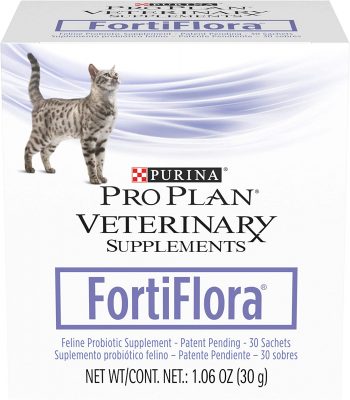
Editor’s Rating:
Why we like it: Purina’s FortiFlora is veterinarian recommended and easy to use. Combine a medically-effective product with a flavor cats can’t resist and you have a wonderful feline probiotic.
Quick Facts:
- Type of Probiotic: Powder
- CFUS: 100 Million
- Number of Strains: 1
This probiotic is pre-portioned and individually packaged for ease of use. One packet per day is the recommended amount for most cats. It mixes into food very well, and is virtually undetectable once stirred into dry or wet cat food. This makes it a great option for giving to cats who refuse to eat any kind of supplement they can see.
Even picky cats will like the flavor of this probiotic. It has liver added to it to boost protein in the supplement and make it palatable. If your cat is a fan of liver-flavored things, be sure to look at Probonix Probiotics as well.
Purina uses an exclusive microencapsulation process in the development of this product, which enhances the stability of the cultures inside. This guarantees that your cat will get the maximum amount of benefits possible from the supplement. It is a good option for cats who have sensitive stomachs or suffer from diarrhea, as the bacteria strain used in this product is strong against digestive upsets.
It does only have one probiotic strain, which can be a drawback if you are looking to improve or maintain your cat’s overall health. More diversified strains, like the ones in PetUltimates, are better for immune support and maintenance.
This product also has brewer’s yeast in it, which can cause allergic reactions in some cats, especially those who are sensitive to grains. Look for a wheat- and yeast-free probiotic is your cat has had issues in the past with grain sensitivity.
Pros
- Individually packaged portions for convenience
- Flavor suits even picky cats
- Mixes into food very well
- Microencapsulation process used for probiotic stability
Cons
- Only one probiotic strain
- Brewer’s yeast may cause allergic reactions
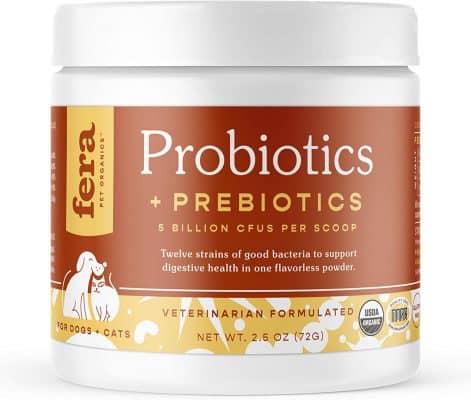
Editor’s Rating:
Why we like it: USDA certified organic and designed by a veterinarian, FERA Probiotics features 12 strains of live bacteria and a preservative-free formula.
Quick Facts:
- Type of Probiotic: Powder
- CFUS: 5 billion
- Number of Strains: 12
FERA Probiotics are designed by a veterinarian that understands how probiotics work to benefits your cat’s digestive system. These probiotic strains are specifically chosen to complement each other and work towards improving your cat’s overall health, enhancing things such as their coat, energy, and metabolism. It is a good choice if you want a probiotic that acts as a general health booster and maintenance supplement for your cat.
This product is USDA certified organic and has no added ingredients, fillers, or preservatives. It is a flavorless powder that most cats will not be able to detect in their food. If your cat has allergies to wheat or other animal by-products, this probiotic is a safe choice to purchase.
Unfortunately, this product’s high strain count can cause some cats to vomit or otherwise reject the probiotic. It may be because their system is not used to a supplement like this, or they just plain don’t like it. You can start off giving lower than the recommended dose to ease your cats into this supplement, but if you’d rather not take the risk, look at an easier-to-digest product, such as NaturVet’s Digestive Enzyme.
Pros
- USDA certified organic
- Designed by a veterinarian
- No added ingredients or preservatives
- Flavorless
Cons
- May cause some cats to vomit
3. Best Budget Cat Probiotic: PetUltimates Probiotics for Cats
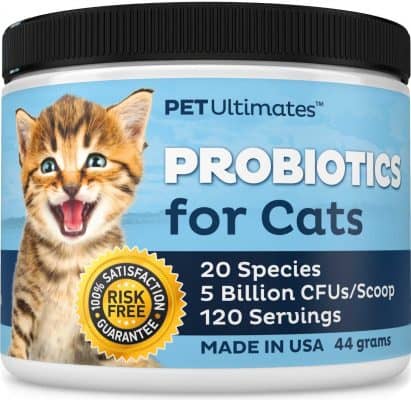
Editor’s Rating:
Why we like it: This ultra-concentrated probiotic boasts 20 different probiotic strains and a large serving quantity, making it a great budget buy.
Quick Facts:
- Type of Probiotic: Powder
- CFUS: 5 Billion
- Number of Strains: 20
Probiotics can be an expensive investment, but PetUltimates helps alleviate the financial cost with their large quantity of probiotic powder available affordably. The price fits most budgets, and if you are a multi-cat household, this would be an especially good purchase due to the serving size.
PetUltimates is ultra-concentrated, so your cat gets the most benefit out of every serving. There is also a diverse amount of probiotic strains in this supplement, which make it great for boosting the immunity of your cat. If multiple strains are important to you in a probiotic, also check out Dr. Mercola’s 14 strain probiotic.
This product does have a strong, almost chemical smell to it. You might have trouble getting it to blend in properly with food and be undetected by your cat. Some cats may even refuse to eat their food outright with this probiotic mixed in. Try blending it with a wet food if your cat won’t eat it.
Pros
- Large quantity for an affordable price
- Diverse amount of probiotic strains
- Ultra-concentrated
Cons
- Strong chemical smell
4. Best Pill Probiotic: Nutramax Proviable DC for Cats
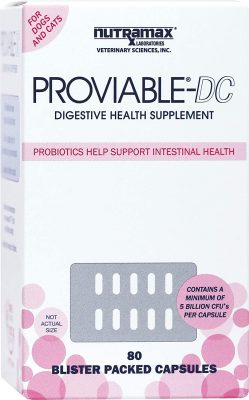
Editor’s Rating:
Why we like it: Nutramax Proviable DC has a formula that includes prebiotics to complement probiotic strains and lay the groundwork for a healthy gut microbiome.
Quick Facts:
- Type of Probiotic: Pill
- CFUS: 5 Billion
- Number of Strains: 7
The seven unique strains in this product are carefully selected to provide major health advantages to your cat. They include a strain of prebiotics that work in tandem with the probiotics and help make the gut a more hospitable environment for healthy bacteria to colonize. It makes a good option if your cat has previously shown resistance to probiotic supplements.
Nutramax pills are great for use after antibiotics, and the strains included in this product are formatted to help reduce stress in cats. For cats that refuse to take pills, you can open the capsule and mix it into their food. It makes a great choice if you want the option of switching between pills and powder probiotics.
This product does contain fructooligosaccharides. This is a type of sweetener that, while working as a prebiotic, may cause digestive upset in some animals. If you know your pet is sensitive to sugars, maybe select a product like Purina FortiFlora with no extra added sweeteners.
There are also some concerns surrounding counterfeiting of Nutramax probiotic products. A few online retailers were found to be selling knock-off versions of this supplement that either had no effect or were unsafe for your pet. When purchasing this product, make sure it comes from a reputable source and return the product immediately if you suspect it has been counterfeited.
Pros
- Includes complementary prebiotics
- Great for use after antibiotics
- Works to reduce stress
- Pills can be opened for easy dosing
Cons
- Contains fructooligosaccharide
- Potential counterfeiting concerns
5. Best Digestive Enzyme: NaturVet Digestive Enzymes Plus Probiotics & Prebiotics
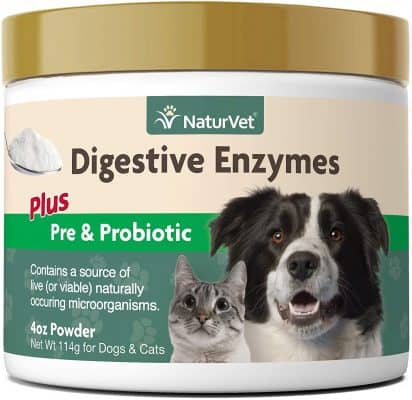
Editor’s Rating:
Why we like it: This digestive enzyme is perfect for sensitive stomachs and the included pre and probiotics help improve overall digestive health.
Quick Facts:
- Type of Probiotic: Powder
- CFUS: 100 million
- Number of Strains: 1
If your cat has a sensitive stomach, this digestive enzyme and probiotic combination may be the supplement for you. This product helps to replace essential enzymes that are involved with the food digestion process, boosting your cat’s metabolism. The accompanying prebiotics and probiotics ensure that the digestive system stays healthy once populated by good bacteria and enzymes.
NaturVet comes in a very fine powder that easily sticks onto dry food. It also mixes well into wet food, virtually disappearing after a quick stir. It can be a good choice if you feed your pet both types of foods throughout the day. There is also a money-back guarantee on this product, so if your cat refuses to eat it, you can easily request a refund.
This product can be a little hard to dose because there is no scoop included in the package and dosages are given in terms of teaspoons. Make sure you have a reliable measuring tool before purchasing this product and read the instructions carefully so you give your cat the right dosage for their weight. If you prefer an easier way of giving supplements, look at Pet Naturals one-a-day probiotic chews.
Pros
- Helps replace digestive enzymes
- Great for sensitive stomachs
- Fine powder sticks easily on dry food
- Money-back guarantee
Cons
- Hard to dose
6. Best Quick-Acting Probiotic: Vetrinex Labs Probiotics for Dogs and Cats
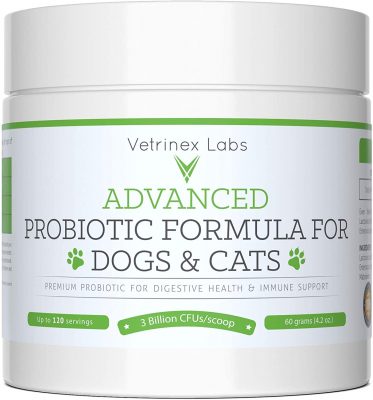
Editor’s Rating:
Why we like it: This all-natural probiotic is quick-acting, providing beneficial results for your cat in a matter of days.
Quick Facts:
- Type of Probiotic: Powder
- CFUS: 3 Billion
- Number of Strains: 7
Vetrinex Labs has designed a quick-acting probiotic for cats and dogs. The formula is all-natural, with no added gluten, soy, or preservatives. Improvements in your cat’s digestive system may be noticed after a couple of days of administering the supplement, but full benefits will start to take effect in as little as two weeks.
This product has a guaranteed source of live active cultures. Live probiotic strains are more potent, making this a great choice for first-time users of a feline probiotic. The powder has a light consistency that most cats will not notice when it is mixed in with their favorite food or treat.
While it helps with regularity and stomach upset, it is not the most effective product for stopping diarrhea in your cat due to the specific selection of strains in the formula. If feline diarrhea is your main concern, we recommend looking at Dr. Mercola’s pet probiotics.
Pros
- Improvements in as little as two weeks
- All-natural formula
- Guaranteed live active cultures
- Light consistency
Cons
- Not as effective for stopping diarrhea
7. Best Chewable Probiotic: Pet Naturals of Vermont Daily Probiotic
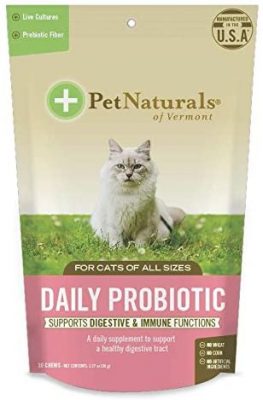
Editor’s Rating:
Why we like it: This chewable probiotic is a great way to get your picky pet to take their supplement every day with a flavor and texture cats are sure to love.
Quick Facts:
- Type of Probiotic: Chew
- CFUS: 100 Million
- Number of Strains: 1
These chews are duck flavored and sure to get your cat’s attention. Even though there is only one probiotic strain, it does strongly support overall digestive health; it is completely undetectable and fully blended into these treats. They are a good choice if your cat is picky about eating dry food as they have a soft, easily chewable texture.
The formula is completely wheat- and corn-free, which is good for cats with food sensitivities. Compared to powders and pills, these chews are a very easy, fuss-free way to give out supplements. Your cat likely won’t even realize there is anything different about them from regular treats, which is good for a picky eaters or cats who don’t like getting medicine.
The overall size of these chews may be too big for some cats, especially for smaller kittens. They can be broken down, but then your cat would not be receiving the full dose. It is also a relatively small bag, and can get expensive if you stick to the one-a-day dose recommended. For a more economical product, check out PetUltimates.
Pros
- Duck flavored
- Soft texture most cats enjoy
- Easy, fuss-free way to give supplements
- Wheat- and corn-free
Cons
- Size is too big
- Small bag
8. Best for Cats with IBD: Dr. Mercola Complete Probiotics for Pets
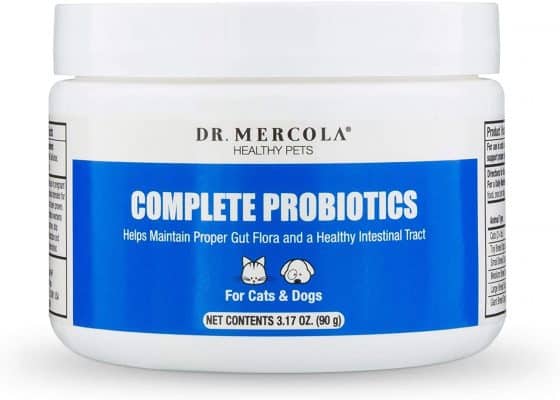
Editor’s Rating:
Why we like it: Dr. Mercola’s Complete Probiotics are fantastic for relieving symptoms in cats with severe digestive issues or medical conditions like IBD.
Quick Facts:
- Type of Probiotic: Powder
- CFUS: 38 Billion
- Number of Strains: 14
Due to the extraordinarily high number of CFUs in this product, this is a great choice for when your cat needs intensive repair or support of their digestive tract. Each of the 14 strains works to stop diarrhea, sensitive stomach issues, and vomiting. It can also help relieve the symptoms of IBD and give your cat much-needed relief.
The probiotics in this product are carefully selected to help with the production of B vitamins and lactic acid. This can help improve your cat’s immune system and their overall digestive health. If your cat is struggling with sensitive stomach issues, this supplement can decrease or even eliminate gastrointestinal issues.
While the high number of CFUs can be a benefit in cats with severe digestive issues, for a cat who just needs general maintenance or that doesn’t have medical issues, the CFUs may be too high. A side effect of having too many unneeded CFUs are the exact digestive upset issues of diarrhea and vomiting that you are trying to alleviate; thus, a healthy cat might be better served by a more supplement-style product. We recommend something like FERA Probiotics and their organic, supportive formula.
This product also has a thicker, starchy consistency that some pets may not care for. If you want a powder probiotic that blends better with food, take a look at Premo Pet Probiotics.
Pros
- Great for intensive repair
- Supports cats with IBD
- Supports production of B vitamins and lactic acid
Cons
- Thick, starchy consistency
- May be too high in CFUs for some cats
9. Best Liquid Probiotic: Probonix Probiotics for Cats

Editor’s Rating:
Why we like it: This liquid probiotic is simple to administer and liver-flavored so your cat finds it irresistible.
Quick Facts:
- Type of Probiotic: Liquid
- CFUS: 3 Million
- Number of Strains: 8
Probonix Cat Probiotics is created with a trademarked acid-coating formula. This unique formula ensures that the live probiotics will survive the highly acidic environment of the stomach before being released alive into the gut where they will begin benefitting your cat. It is a great option if you want to ensure your cat is getting the full benefits of a probiotic.
This product is non-GMO, and the formula is completely grain and sugar-free. It can help reduce the symptoms of environmental allergies or food sensitivities in your cat when given on a consistent basis. It is not a cure for any type of food allergy, but it can help reduce the symptoms if your cat accidentally encounters a food that normally doesn’t sit well.
It does come in a fairly small bottle, which may not be the best if you are a multi-cat family. It can also be hard to ensure your cat gets the correct dose when you add these drops into water; your cat may not drink all of their water that day, or other cats may drink bigger servings of the water. A more certain way to dose this probiotic is by adding the product to food. If you don’t want to worry about these dosing concerns, we recommend looking at Pet Naturals one-a-day chews for easier supplementation.
Pros
- Non-GMO
- Acid-coating formula ensure survival of probiotics
- Helps with cat allergies or sensitivities
Cons
- Small bottle
- Might not be effective in your pet’s water
10. Easiest to Digest: Premo Pet Probiotic for Cats
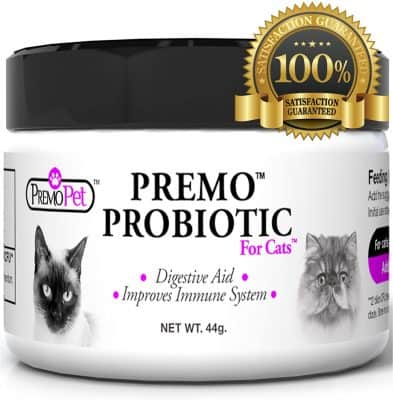
Editor’s Rating:
Why we like it: Premo is easily digestible and produced in a US certified-natural products facility, so you know you’re purchasing a safe, quality product for your kitty companion.
Quick Facts:
- Type of Probiotic: Powder
- CFUS: 2 Billion
- Number of Strains: 6
The facility that produces Premo Pet Probiotics is both a USA-certified Natural Products Association (NPA) and Good Manufacturing Practice (GMP) facility. This means that the facility meets high standards for quality control and produces a safe, healthy product for your cat. It is a great option if you are concerned with the safety standards surrounding feline probiotics.
The powder is fine in texture and easy for most cats to digest. It is not too thick or too starchy to properly mix into food. Each probiotic strain added into this formula works with the others to improve digestive functions and promote overall health. If your cat is prone to yeast infections or hotspots, this product is a fantastic option for you.
On the downside, this product can give some cats gas. If you notice your cat has increased flatulence after a day or two, you may want to consult with a vet and/or discontinue use of the product. Some cats also really hate the taste of this product and will refuse to eat it. For a product most cats love the taste of, look at Purina FortiFlora.
Pros
- Manufactured in a USA-certified NPA and GMP facility
- Powder easy for most cats to digest
- Probiotic strains specifically selected for overall feline health
- Relieves symptoms of hotspots and yeast infections
Cons
- Can give cats gas
- Some cats hate the taste
Buying the Best Cat Probiotics
Selecting the best cat probiotic can be a difficult process. In our guide, we will provide you with some of the most important things to keep in mind regarding feline probiotics to purchase with confidence.
How Do Probiotics Work?
Probiotics are a good bacteria that, when introduced to your cat’s intestinal microbiome, fight bad bacteria and restore digestive balance. The strains form colonies in your pet’s intestines and get to work supporting the immune system, which has a series of positive effects on your cat’s health. All this is to say that a feline with a healthy gut is a cat of culture.
The Benefits of Probiotics for Your Cat
There are many benefits your cat can gain from taking probiotics, especially if they already have digestive issues.
Fighting Digestive Issues
For cats with sensitive stomachs and medical disorders like Inflammatory Bowel Disease (IBD), daily life may be a struggle filled with a regrettable amount of vomiting and diarrhea. Probiotics cannot completely cure these diseases, but they can reduce the severity of symptoms; sometimes symptoms will completely disappear, allowing your cat to live a normal life.
Reducing Allergies
If your cat has food or environmental allergies, adding probiotics into their diet may help reduce symptoms. They are not a complete cure for your kitty, but there is a chance that the severity of the allergy will be reduced and your pet can become more comfortable.
Strengthening the Immune System
Probiotics work to prevent the growth of bad bacteria in the gut. Some strains are also known to help synthesize naturally occurring antibodies, leading to a strong immune system. This can aid your cat in fighting off any illnesses and leading an overall healthier life.
Antibiotic Effects
Sometimes cats need antibiotics to help fight off a particularly nasty infection or illness. As with humans, antibiotics can wipe out all the bacteria in your gut, good and bad, and leave your kitty susceptible to developing diarrhea or other digestive issues.
Supplementing your cat’s diet with probiotics, preferably one with a high CFU like Dr. Mercola’s Complete Probiotics will replenish their digestive tract with healthy bacteria and can often eliminate diarrhea.
Improving Heart Function
Probiotics can reduce total and LDL cholesterol levels in cats, allowing the heart muscles to pump blood more effectively and continue to stay strong. While some cats are genetically predisposed to issues like feline cardiomyopathy, probiotics can help reduce hypertension, which in turn reduces your cat’s risk of developing the disease.
How Long Do Probiotics Take to Work?
You may see improvements in your cat within the first couple of days of taking a probiotic, but it usually takes between 2 and 3 weeks to witness the full effects. This is because it takes time for the probiotics to start fighting off bad bacteria in the gut and begin forming healthy colonies.
Can You Give Your Cat Too Many Probiotics?
You can, in fact, overdose your cat on probiotics. While unlikely fatal, too many probiotics can lead to vomiting, diarrhea, and general digestive upset – usually the most common symptoms pet parents hope to treat with probiotics.
In order to avoid giving too many probiotics, stick to a daily feeding schedule that is approved by a vet. If you are adding probiotics in your cat’s water, make sure they drink all of their water and rinse/refill the bowl between doses. You don’t want to continually add doses into water when you aren’t sure they finished the first one.
If you miss a probiotic dose, don’t double up on the next one, just continue on the schedule as you regularly would. One or two missed doses is usually nothing to worry about, but be sure to stay consistent with your probiotic supplements for the best results and to avoid further digestive upset for your kitty.
Side Effects of Probiotics
Taking probiotics could increase instances of diarrhea in your cat for the first couple of days. This is part of a transitioning period as they get used to the supplement. If this diarrhea is accompanied by vomiting and general lethargy, discontinue use and consult with a vet.
Another risk factor that accompanies feline probiotics is an issue with human probiotics as well: they are not strictly regulated by any government agency. Most probiotics are sold as dietary supplements, which don’t require preapproval by the FDA to be sold. These standards are even lower for pet probiotics due to the fact that they are intended for animals.
When purchasing a probiotic, make sure you are selecting a reputable brand and read reviews of the product to confirm successful medical outcomes. Doing this can help you avoid products that don’t have any effect or are dangerous for your cat.
How to Get Your Cat to Take Probiotics
Depending on your cat’s temperament, purchasing a probiotic may be the easiest step in getting your cat to take it. Each probiotic will have a different formula, but these pro tips to help you in administering supplements to your furry friend are universal.
Mixing with Food
Powder probiotics such as Purina’s FortiFlora are the easiest to mix into food. If your cat refuses to eat it when it is on top of the food, the best thing you can do is mix it in. Wet food can help hide any scent or taste, but you can add a little bit of warm water to dry food and stir that in along with the probiotic if your cat doesn’t care for wet food. This method also works well for liquid probiotics.
Getting Your Cat to Take a Pill
Stressful for both you and your cat, administering a probiotic pill can be a difficult task. If you’ve absolutely settled on purchasing a pill probiotic for your cat, there are some steps you can take to make the process easier.
- Step up a comfortable, safe area to give out the pill. Make sure it is easily accessible and that your cat is relaxed in front of you.
- If giving the pill by yourself, pull the cat onto your lap. It may be easier to wrap them in a pillowcase or soft towel with just their head exposed to contain their claws.
- Add a small amount of butter onto the pill. This ensures it won’t stick as it goes down your cat’s throat.
- Use your dominant hand and hold the pill between your index finger and thumb.
- With your non-dominant hand, grasp your cat’s head firmly and gently pull it back so their nose is facing up. Their jaw should drop open slightly.
- With the pill in your hand, use your ring finger and little finger to open their jaws even further. Put light pressure around the lower lip and front teeth.
- As fast as possible, place the pill on the back of the tongue. Aim for the back third of the tongue to trigger an automatic swallowing reflex.
- Close your cat’s mouth and hold it closed. Return the head to a normal position and gently rub their throat or lightly blow on their nose to encourage them to swallow. Cats will often stick out their tongue and lick their nose once the pill is swallowed.
After the pill has been successfully administered, make sure to give positive reinforcement to your cat. Follow up with their favorite treats, give love, or play with them using their favorite toys. This video can help guide you through the process.
If you have difficulty pilling your cat, ask your vet for guidance or consider purchasing a “pet piller” device to help you out.
Important to Know
When considering adding a probiotic to your cat’s diet, always consult with a vet prior to use. A vet can help point you in the right direction of which ingredient and type of probiotic will be the best for your cat, as well as assist you in adjusting the dosage.
As with all supplements, make sure to monitor your cat closely after feeding the probiotic and discontinue use if they show signs of distress such as vomiting, lethargy, or an allergic reaction. Contact a vet if these symptoms don’t disappear within a few hours.
Keeping Your Cat Healthy and Happy
Digestive issues can be an unlikable experience for both you and your cat. With the help of the right feline probiotic, however, your cat’s digestive health will improve and their trips to the litter box will become regular.
Choosing the correct probiotic may seem difficult, but as long as you keep in mind your cat’s specific dietary needs and tolerance for taking supplements, you’ll be on the right track to keeping your cat healthy and happy for life.

